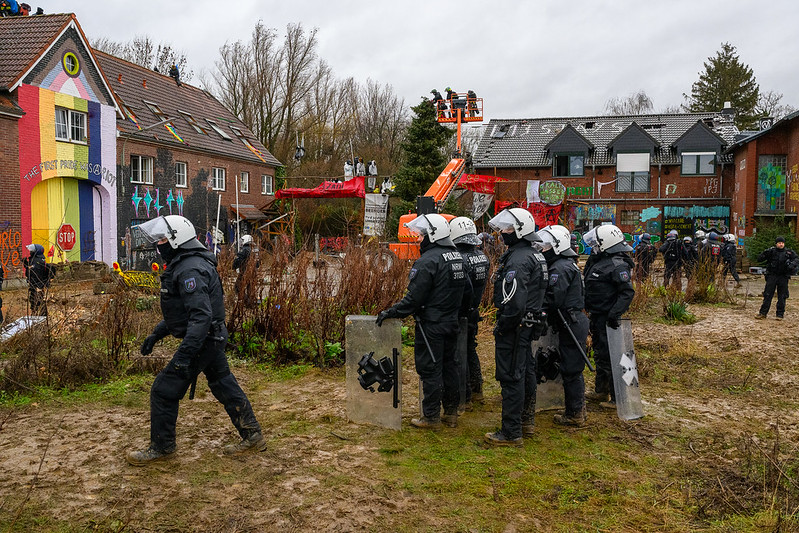Linné Must Fall
2023-07-21

Flyer “Why Linné Must Fall” (LinnéMustFall, 2022).
Our university is named after Carl Linneaus (1707-1778), also known by his noble name Carl von Linné. Natural scientists classify flora and fauna until today with a system of categorization (taxonomy) which has developed from Linnaeus’ work of organizing animals and plants into an array of groups depending on their characteristics. Linnaeus and his work have significant colonial legacies (Charmantier 2020). In this blog entry, I will summarize these colonial legacies, sketch out how our university uses Linnaeus’ name and heritage (spoiler alert: they proudly speak of a so-called “Linnéan spirit”), and explain why and how some students have started to urge the university that Linné Must Fall. Linné Must Fall is inspired by Rhodes Must Fall, South African and English student movements which have called for both symbolic and material changes of university structures since 2015. This included, e.g., changes of names, taking down statutes that honor colonial figures, abolishing tuition fees, and decolonizing curricula by including diverse literature from across the globe (Mbembe 2016; Booysen 2016).
Linnaeus’ colonial heritage
In Linnaeus’ famous work Systema Naturae (“the system of nature”) of which he published manifold editions, Linnaeus did not only categorize plants and animals but also humans. Throughout the different editions of Systema Naturae his categorization of groups of people became more detailed – and racist. His categorization of humans became central for scientific racism which has been used by white people to justify the colonial exploitation of people of color across the globe. Linnaeus described people along the continents he knew of (Africa, America, Asia, Europe) and unrealistic skin colors (black, red, white, sallow), assigning each group of people a set of interior characteristics. He arranged these groups hierarchically, changing the hierarchy of some groups over time, but never of the ones he ranked lowest: Black people. There is no evidence that Linnaeus ever used the word human races. Instead, he spoke of human varieties. Still, his categorization of humans is utterly racist: Constructing groups of people along random characteristics such as perceived skin color, generalizing the people within each of these groups, assuming that all of them have certain traits due to their outer characteristics, and ranking them hierarchically (Eze 1997, 13; Charmantier 2020).
Moreover, Linnaeus contributed to the Swedish colonization of Sápmi, the land of the Indigenous Sámi, exploring the presence of raw materials and opportunities for economic exploitation of the area. He appropriated Sámi knowledge, e.g., about medicinal plants, for his work (Koerner 1999, 75). Linnaeus’ colonial entanglement is not the only problematic aspect about his persona. He also lied about his journeys, doubling and tripling the distance he had travelled supposedly (Koerner 1999, 61f.). In addition to that Linnaeus’ categorization of humans can be interpreted as sexist: Among other possible options such as body hair, Linnaeus chose female breasts (lat. mamma) as the indicator for grouping humans among animals (in the group mammals), while he used the male term “homo sapiens” (lat. the wise human) to describe the specificity of humankind separating it from the animal world. Furthermore, Linnaeus argued for the abolishment of wet nursing because he thought that the milk from working-class women would degenerate upper-class children, hence promoting that middle and upper-class women should stay at home with their children.
In our Postcolonial encounters class on Linnaeus’ colonial heritage in April 2023, our guest and Linnaeus-expert Linda Andersson Burnett debunked the common argument that “he was just a child of his time”, since it denies the presence of people such as the author and activist Olaudah Equiano (1745–1795) who rallied against racism, enslavement, and colonialism while Linnaeus was contributing to the foundation of so-called scientific racism.
How Linnaeus University deals with Linnaeus’ colonial heritage
Studies about the colonial heritage of Linnaeus have been around in international scholarship since the past century. In Sweden, however, Linnaeus still holds the status of a national hero (Hodacs, Nyberg, and Damme 2018, 9f.). This explains why Linnaeus university could still be named after him as late as 2010 when the university was formed, joining the institutions of higher education in Kalmar and Växjö. Linnaeus is present in many aspects of this university, from the name of the Linnaeus Gallery, which is a part of the library, over the scientific plant drawings on any official document to the logo of the student union (the flower of a plant that was named after Linnaeus, the linnaea borealis). Scholars from Linnaeus university engaged in an attempt to declare his legacy as UNESCO cultural heritage in 2016 (LNU 2016). And in the vision 2030 document of the university, it is stated that
“[t]he Linnéan spirit mirrors the academy’s reflected, critical and creative societal task. We are inspired by Carl von Linné and let the work thrive from curiosity, innovative utility, and proximity.” (Linnéuniversitetet 2019, 4, translation from Swedish by me)
This document was written before the Black Lives Matter movement in 2020, one might argue, which sparked heated debates about the presence of Linnaeus in Swedish cityscapes, especially in the form of statues (Hübinette, Wikström, and Samuelsson 2022). But sadly, the idea of the Linnaean spirit as something positive is still alive on our campus, as I had to realize, when the dean of a faculty referred to it as a source of inspiration during my graduation ceremony in June 2023. The university website and its campus lack information about Linnaeus’ colonial heritage, which at least would show a certain amount of reflection.
Debates about changing the name of the university come up in waves, but have not led to any change – yet. In spring 2022, students organized an information campaign on campus, spreading flyers, holding a banner and talking to fellow students about Linné Must Fall. Especially international students and students of color are outraged by the name when they learn about Linnaeus’ colonial heritage. Some feel that the name is like “a punch in their face”. Several students suggested to call the university “Universtiy of Småland” instead. Others point out the hypocrisy of marketing Linnaeus university as an “international university” in its slogan. Choosing a racist name but still making profits with the tuition fees that only students from outside Europe need to pay in Sweden? It thus seems to be a question of time that Linné will fall.
Finally, it is important to note that it is never about a single person, in this case Linnaeus, but always about a system (Hodacs, Nyberg, and Damme 2018, 10). In the struggle to make Linnaeus fall, it is crucial to acknowledge that science until today is part of (neo)colonial endeavors, such as present-day green colonialism in Sápmi (Öhman 2017).
Maria Fahr
Things you can do:
- Learn about anti-racism and colonial history.
- Discuss the issue with your friends and fellow students. Organize.
- Urge the university to at least install signs and information about Linnaeus’ colonial heritage on campus and the website.
- Collect signatures for a change of the university name.
- Call out when university staff uses the language of the “Linnéan spirit”.
- Instead of Linnaeus university, you can use “University Currently Known as Linnaeus” in your assignments. This idea comes from the #RhodesMustFall movement in South Africa, where students started to call their university University Currently Known as Rhodes.
- Highlight that a change of name is an important symbolic change but not enough. It also needs material changes, such as the abolishment of tuition fees for non-European students.
Documents
Flyer front Why Linné Must Fall
Flyer back Why Linné Must Fall
Literature
Booysen, S. (2016) Fees must fall. Student revolt, decolonisation and governance in South Africa. Johannesburg: Wits University Press. Available at: https://www.jstor.org/stable/10.18772/22016109858 (Accessed: 1 September 2021).
Charmantier, I. (2020) Linnaeus and race. Available at: https://www.linnean.org/learning/who-was-linnaeus/linnaeus-and-race (Accessed: 8 November 2022).
Eze, E.C. (ed.) (1997) Race and the enlightenment. A reader. Malden, Mass.: Blackwell.
Hodacs, H., Nyberg, K. and Damme, S. van (2018) ‘Introduction. De-centring and re-centring Linnaeus’, in H. Hodacs, K. Nyberg, and S. van Damme (eds) Linnaeus, natural history and the circulation of knowledge. Oxford: Voltaire Foundation, pp. 1–24.
Hübinette, T., Wikström, P. and Samuelsson, J. (2022) ‘Scientist or racist? The racialized memory war over monuments to Carl Linnaeus in Sweden during the Black Lives Matter summer of 2020’, Journal of Ethnic and Cultural Studies, 9(3), pp. 27–55. Available at: https://doi.org/10.29333/ejecs/1095.
Koerner, L. (1999) Linnaeus. Nature and nation. Cambridge, Mass.: Harvard University Press.
Linnéuniversitetet (2019) Vision 2030 Vi sätter kunskap i rörelse för en hållbar samhällsutbildning. LNU 2018/1082-1.1.1. Available at: https://lnu.se/globalassets/dokument—gemensamma/personalavdelningen/hrs4r/appendix_lnu.pdf (Accessed: 11 May 2022).
LNU (2016) Universitetet stödjer ansökan för nytt världsarv kopplat till Carl von Linné, Lnu.se. Available at: https://lnu.se/mot-linneuniversitetet/aktuellt/nyheter/2016/universitetet-stodjer-ansokan-for-nytt-varldsarv-kopplat-till-carl-von-linne/ (Accessed: 21 July 2023).
Mbembe, A.J. (2016) ‘Decolonizing the university. New directions’, Arts and Humanities in Higher Education, 15(1), pp. 29–45. Available at: https://doi.org/10.1177/1474022215618513.
Öhman, M.-B. (2017) ‘Kolonisationen, rasismen och intergenerationella trauman. Analys, reflektioner och förslag utifrån ett skriande behov av samiskLEDD forskning och undervisning’, in. Uppsam – föreningen för samiskrelaterad forskning i Uppsala, pp. 99–113. Available at: http://urn.kb.se/resolve?urn=urn:nbn:se:uu:diva-317735 (Accessed: 2 March 2023).













Recent Comments